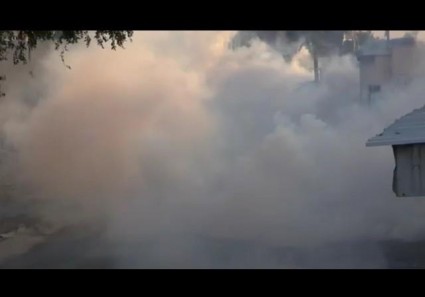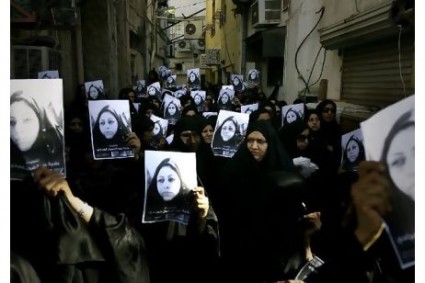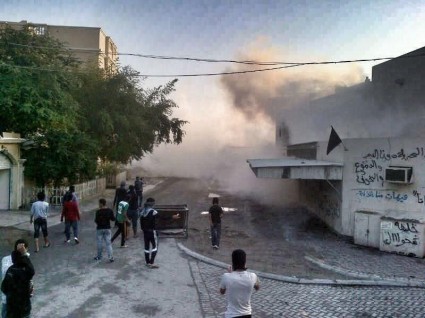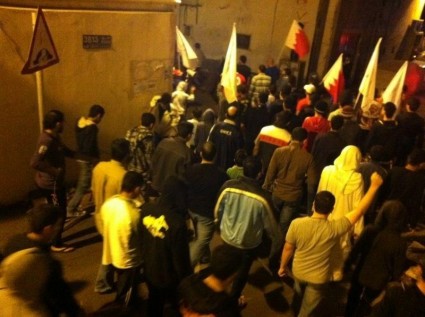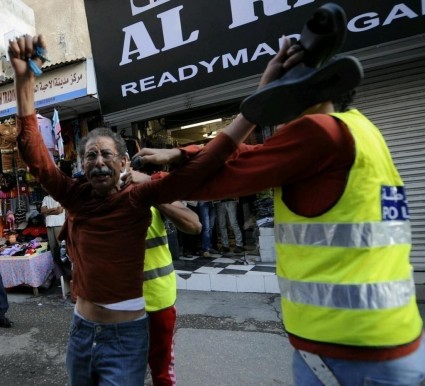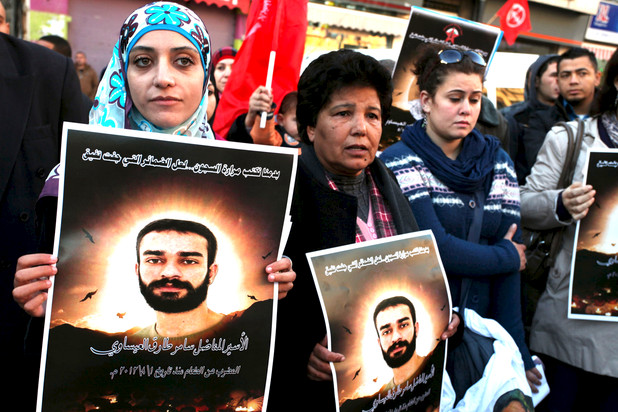Hamad, confused why he can’t find anyone for his “dialogue” – only dialogue left is about your exodus
December 19, 2012 Add Comments
Between 16-17 December 25 people arrested, 31 villages attacked in violent assaults
December 19, 2012 Add Comments
Almqha Marches for Freedom
December 19, 2012 Add Comments
Revolution is knocking at the door Hamad
December 19, 2012 Add Comments
The Revolution will Continue – Rajab Behind Bahraini Prison Bars: “I Am Free…Western Silence is Bought with Oil and Arms Deals”
Imprisoned Bahraini activist Nabeel Rajab speaks from behind bars with Rasha Abi Haydar, assuring listeners that despite the regime’s attempts, the peaceful revolution will continue.
Nabeel Rajab to As-Safir From Behind Bahraini Prison Bars: I Am Free…Western Silence is Bought With Oil and Arms Deals
Author: Rasha Abi Haydar – 14 December, 2012 – Translated 18 Decemebr, 2012 by: Tyler Huffman – Al Monitor – As-Safir
Nabeel Rajab is the most influential figure in Bahrain. He is a human rights activist who has been in prison since June 7, and a few days ago was sentenced to two more years in prison — after an initial sentence of three — on charges of organizing “unauthorized gatherings.” Since his arrest, Rajab has become a nuisance and a threat to the authorities’ prestige, and has exposed their continued violations.
Only a few days before his arrest, Rajab met with colleagues from As-Safir in an area that he “loves as much as Bahrain”: Hamra Street in Beirut. Today, after several attempts, As-Safir has succeeded in making his voice heard by the world. No one can silence his statements from behind prison bars.
As-Safir: Why did the judiciary uphold your imprisonment, when the sentences for similar charges are usually much lighter?
Rajab: In fact, the damage incurred by the Bahraini regime as a result of my imprisonment — in terms of its international reputation and image — outweighs the damage this imprisonment inflicts on my own liberties. Keeping a human rights activist in jail all this time because he participated in or called for peaceful demonstrations is something that the civilized world no longer accepts. I was shocked by the judgement issued against me because of something I posted on Twitter, or because [I organized] an unauthorized protest. I didn’t expect the authorities to imprison me as a result of such trivial charges, at a time when it is trying to appear as though it respects human rights.
The authorities claim that they do not prevent anyone from exercising his or her right to demonstrate, but the reality contradicts this. Bahraini prisons are teeming with detainees whose only charge is participating in peaceful marches against the government. Yet, unfortunately, the media has not highlighted their cases as they have mine.
The convictions issued against me reveal the size of the imbalance in the Bahraini judiciary, as well as the extent of the judiciary’s submission to the executive authorities. These charges have drawn international attention to the nature of the regime in Bahrain, and proved to the world that the authorities have had enough of my continued criticisms in the media and the press. [This has proven] that the authorities are willing to violate international law — regardless of the extent of these violations — in order to silence me.
As-Safir: But do you pose a threat to the regime, to the extent that they would imprison you for such a long period?
Rajab: I do not pose a threat to any political system. I am a rights activist. I have not, and do not, call for regime change or a coup. I defend the right of everyone to express their views and demands peacefully. The right to expression is guaranteed to all, both those who call for the reform of the regime and those who call for regime change. Had the regime dealt with these rights in the proper manner, there would been no opposition to the regime today. But the regime is afflicted with greed and tyranny, and is blind to anything but its own interests.
Here I want to tell the authorities that they must understand that violence only begets violence. All past experiences have confirmed that violence does not produce solutions, but only produces more violence and killing, and the past two years in Bahrain are the best proof of that. The continued ratifications of laws and legislation that restrict freedoms will not work.
As-Safir: Why has the regime declared war on human rights activists?
Rajab: This culture of human rights activism is new to the Arab world, and likewise to Bahrain, and human rights activists have had a lot of influence on people because their movements focus on demanding respect for moral and humanitarian standards, principles and values — far removed from seeking political positions or calling for specific political systems. Unfortunately, instead of working with human rights activists as experts [who can help] reform the legal structure to serve the people, the regime has considered them a direct threat to its existence, and decided to wage war on them.
The question here is: Has this targeting succeeded in stopping those demanding their rights? Of course not — in fact, the opposite is true. I believe that the regime now knows that imprisoning activists will not stop this phenomenon. Rather, the oppression practiced by the regime will spread this culture [of activism] more quickly. It has become clear that my imprisonment has doubled the amount of rights activism in Bahrain; it will not stop it or limit it.
[Read more →]
December 19, 2012 Add Comments
Bahrain regime continue in self defeating litany of brutality and repression
Bahraini forces fire tear gas on Manama protests
18 December, 2012 – Islamic Invitation Turkey
Saudi-backed Bahraini forces have fired tear gas to disperse anti-regime protesters in the capital as Manama’s crackdown on the opposition continue.
Witnesses say hundreds of Bahrainis took to the streets across the capital overnight to protest against the ruling Al Khalifa family.
Activists say the situation in the capital remains volatile and that the military has set up checkpoints in and around Manama to prevent further demonstrations.
On Monday, regime forces arrested over 25 demonstrators in and around the capital, who took to the streets to call for the release of all jailed activists and demanded that King Hamad bin Isa Al Khalifa step down.
Sayed Yousif Al-Muhafda, the head of monitoring and evaluation of the Bahrain Center for Human Rights, was among those arrested. Bahraini forces used tear gas, rubber bullets, and stun grenades to break up the demonstrations.
Opposition rallies have continued in Bahrain in defiance of a government ban on public gatherings. The government’s harsh crackdown on demonstrations has also failed to keep protesters off the streets.
Scores have been killed, many of them under torture while in custody, and thousands more detained since the popular uprising in Bahrain began in mid-February 2011.
Protesters say they will continue holding anti-regime demonstrations until their demand for the establishment of a democratically-elected government is met. …source
December 19, 2012 Add Comments
Bahrain: “rights denied” – protest ban defied
December 19, 2012 Add Comments
Arming Offensively – US prepares ‘Vertically Integrated’ Gulf Allies for the Dirty work of War
U.S. arms to Gulf allies hint of strategy
By Rowan Scarborough – The Washington Times – 16 December, 2012
The largest infusion of U.S. arms ever for Persian Gulf allies has shifted more toward offensive weapons at the same time that President Obama’s military strategy says it will rely more on allied firepower in any future war.
The only war on the horizon for Saudi Arabia, the United Arab Emirates and four other Gulf coalition partners would be with nearby Iran.
Noting U.S. sales of air defense-penetrating F-16s and F-15s, satellite-guided bombs and a pending order for ordnance that can burrow deep and then explode, analysts say Gulf nations could participate in a U.S. air campaign to strike Iran’s nuclear sites.
These American-armed nations could either be part of an overall war plan or be forced to enter the battle once Iran counterattacks, as expected, with missile launches.
“The thinking certainly is that Iran would retaliate against the Gulf states, or at least against the facilities in the Gulf that we use,” said Kenneth Katzman, a Middle East analyst at the Congressional Research Service. “That would certainly draw the Gulf states into any conflict that went on. The Gulf might become embroiled in this conflict, and I think they’ve calculated it’s best to be prepared.”
There has been public focus on the U.S. military buildup in the Gulf — more aircraft carriers, warplanes and strike groups studded with Tomahawk cruise missiles; more minesweeping ships; a visit by Air Force F-22 stealth jets; and thousands of Army soldiers positioned in Kuwait.
But just as methodically, the George W. Bush and Obama administrations have approved a series of large arms sales that are giving some oil-rich Gulf states offensive capabilities that would make Iran think twice about an attack.
Defense Secretary Leon E. Panetta underscored the alliance Dec. 11 when he landed in Kuwait, a staunch Gulf ally, for consultations. He also spoke to some of the 13,500 U.S. troops stationed there.
“Our presence in Kuwait and throughout the Gulf helps advance the capabilities of partnering nations, deters aggression and helps ensure we’re better able to respond to crisis in the region,” Mr. Panetta told reporters beforehand.
At a Kuwait air base, he said America has 50,000 troops and an armada of warships in the region.
Desert Falcons
Mr. Obama’s strategic guidance in January enabled cuts in U.S. troop strength in part by saying that allies would be tasked with providing more firepower in future wars. To observers, that seems to mean the Gulf states would be asked to do more.
The Congressional Research Service, which tracks global arms sales, took special note in its latest report on U.S. weapons pouring into the Gulf states of Saudi Arabia, the United Arab Emirates, Qatar, Oman, Kuwait and Bahrain.
“The U.S. arms agreements with Saudi Arabia were extraordinary, and represent, by far, the largest share of U.S. agreements with the world or developing world in 2011,” the Congressional Research Service said.
Of $56 billion in total U.S. arms sales in 2011 to developing nations, more than half — $33 billion — were inked with the Saudi kingdom. U.S. defense contractors have seen a sales increase from $14 billion in contracts in 2010 to $56 billion in 2011, mostly thanks to oil-rich Gulf states.
In addition, some of the offensive hardware that the Gulf states have received from the U.S. is as good or in some cases better than the U.S. military’s.
Lockheed Martin has been selling the United Arab Emirates an F-16 “Desert Falcon” version known as “Block 60,” for which the country bankrolled the $3 billion development costs. According to DefenseIndustryDaily.com, it is a notch better than the latest Fighting Falcons flown by U.S. pilots.
The Desert Falcons boast extended range, new radars and targeting pods that clearly make the jet an offensive threat against Iran directly across Gulf waters.
The United Arab Emirates has been buying and flying Block 60s since the previous decade. It plans at some point to add other weapons — 2,000-pound bunker-busting bombs used against buried, cemented targets. Obama administration officials said a year ago that they were working to complete the sale.
“It’s perfectly possible the UAE could be asked to try to bomb aircraft shelters, hardened aircraft hangars’ stockpiles, coastal missile sites that are hardened,” Mr. Katzman said. “There are a range of targets that coalition partners like UAE could be asked to take out as part of strike package, if it comes to that.” …more
December 19, 2012 Add Comments
Torture, An All-American Nightmare
Why Zero Dark Thirty Won’t Settle the Torture Question or Purge Torture From the American System
An All-American Nightmare
By Peter Van Buren – 18 December, 2012 – TomDispatch
If you look backward you see a nightmare. If you look forward you become the nightmare.
There’s one particular nightmare that Americans need to face: in the first decade of the twenty-first century we tortured people as national policy. One day, we’re going to have to confront the reality of what that meant, of what effect it had on its victims and on us, too, we who condoned, supported, or at least allowed it to happen, either passively or with guilty (or guiltless) gusto. If not, torture won’t go away. It can’t be disappeared like the body of a political prisoner, or conveniently deep-sixed simply by wishing it elsewhere or pretending it never happened or closing our bureaucratic eyes. After the fact, torture can only be dealt with by staring directly into the nightmare that changed us — that, like it or not, helped make us who we now are.
The president, a Nobel Peace Prize winner, has made it clear that no further investigations or inquiries will be made into America’s decade of torture. His Justice Department failed to prosecute a single torturer or any of those who helped cover up evidence of the torture practices. But it did deliver a jail sentence to one ex-CIA officer who refused to be trained to torture and was among the first at the CIA to publicly admit that the torture program was real.
At what passes for trials at our prison camp in Guantanamo, Cuba, disclosure of the details of torture is forbidden, effectively preventing anyone from learning anything about what the CIA did with its victims. We are encouraged to do what’s best for America and, as Barack Obama put it, “look forward, not backward,” with the same zeal as, after 9/11, we were encouraged to save America by going shopping.
Looking into the Eyes of the Tortured
Torture does not leave its victims, nor does it leave a nation that condones it. As an act, it is all about pain, but even more about degradation and humiliation. It destroys its victims, but also demeans those who perpetrate it. I know, because in the course of my 24 years as a State Department officer, I spoke with two men who had been tortured, both by allies of the United States and with at least the tacit approval of Washington. While these men were tortured, Americans in a position to know chose to look the other way for reasons of politics. These men were not movie characters, but complex flesh-and-blood human beings. Meet just one of them once and, I assure you, you’ll never follow the president’s guidance and move forward trying to forget. …more
December 19, 2012 Add Comments
US floats article portraying Syrian Terrorists as concerned protectors of chemical weapons
Syria rebels fear chemical weapons
19 December, 2012 – Associated Press – The Daily Star
ANTAKYA, Turkey: The new Syrian rebel commander has told The Associated Press that his fighters are monitoring the regime’s chemical weapons sites, but don’t have the means to seize and secure them.
Gen. Salim Idris, who defected from the Syrian army in July, says he is “very afraid” a cornered regime will use chemical weapons in Syria’s civil war. Syria is said to have one of the world’s largest chemical arsenals.
Idris portrayed Syrian President Bashar Assad as a figurehead, saying decisions are made by Assad’s inner circle from the Alawite minority. Idris says the ruling elite won’t surrender and is willing to “set everything on fire.”
Idris also said late Tuesday that the regime has fired three Scud missiles so far and has more trained on northwestern Syria, ready to fire.
December 19, 2012 Add Comments
Obama’s Human Rights Abusing ‘friends’ in Bahrain imprison children, without charges, in adult facilities
Bahrain: Child held without charge in adult prison
19 December 2012 – Amnesty
The detention of a 16-year-old Bahraini boy in an adult prison has been extended for a further week despite the Bahraini authorities’ failure to bring any charges against him, which Amnesty International said violates international standards of justice.
On 11 December, police raided the family home of Mohammad Mohammad ‘Abdulnabi ‘Abdulwasi in Sitra – an island east of the capital Manama – and arrested him, despite failing to produce a warrant. Family members present at the time allege that riot police broke the main door and took money and other possessions with them.
Since his arrest, the 16-year-old has not been allowed to see his family or a lawyer, and his unlawful detention in Dry Dock Prison – a facility for adults – has been extended until 26 December.
“It is absolutely shocking that Bahraini authorities broke into this boy’s house, detained him unlawfully and are still holding him in an adult prison, despite never bringing any charges against him,” said Hassiba Hadj Sahraoui, Deputy Director of Amnesty International’s Middle East and North Africa Programme.
“Mohammad Mohammad ‘Abdulnabi ‘Abdulwasi should not be treated as an adult before the law, and the authorities must immediately grant him access to his family and lawyer. Unless they can disclose the reason for his arrest and charge him with an internationally recognizable offence, he should be set free.”
‘Abdulnabi ‘Abdulwasi’s family did not know his whereabouts for two days after his arrest. On 18 December he was allowed to call them and told them he was being held at Dry Dock Prison, but he has yet to be allowed a visit from relatives or a lawyer.
No charges appear to have been brought against him and the exact reasons for his arrest remain unknown.
Child detention concerns
In the past few months, a growing number of 15 to 17-year-olds have been held in adult prisons and detention centres in Bahrain. Some sources put the number as high as 80.
Many of these children were arrested during demonstrations, where they were accused of “illegal gathering” and rioting.
In some cases, they appear to have been targeted and punished solely for exercising their rights to freedom of expression and assembly.
Some of the child detainees have alleged they were beaten during their arrest or on the way to detention, and some have also been forced to sign “confessions”.
Under international law, anyone under the age of 18 is a child, and children suspected of a criminal offence should be treated according to the rules of the juvenile justice system.
“Children should always be held separately from adults, and the Bahraini authorities must protect all child detainees from torture or other ill-treatment,” said Hadj Sahraoui.
“The Bahraini authorities’ disregard for international juvenile justice standards is just another sad indicator of the ongoing deterioration in the country’s human rights situation.” …source
December 19, 2012 Add Comments
UAE arrests seven for twitter crimes of blogging critique of government and free expression
President Obama’s hostile and aggressive, perhaps even murderous, pursuit of Julian Assange has helped create a “hostile environment” globally toward all who would expose government corruption and violate Human Rights that are deemed ‘friendly ‘ by the USG. The Obama administration has become an enabler of ‘friendly regimes’ that brutally crush their citizens who are evolving internet media tools for ‘free expression’ and documentation of Human Rights abuses they are subject to. Phlipn out.
Seven online activists arrested in United Arab Emirates
Bill Law – BBC – 18 December, 2012
The Emirates Centre for Human Rights said three UAE nationals were detained in Saudi Arabia on Monday and then handed over to the UAE authorities.
It came days after four other activists were arrested in connection with a Twitter account that is critical of the government, the UK-based group added.
Last month, the UAE government tightened the law on internet use.
It became a criminal offence to deride or damage the state or its institutions, or to organise unauthorised demonstrations.
Human rights groups have said the legislation places severe restrictions on the rights to free expression and free association and assembly.
‘Most-wanted activist’
The first four online activists were arrested last week, according to the Emirates Centre for Human Rights.
The authorities were said to be looking for a critic of the government who appears to have received leaked documents from the interior ministry. The activist has a Twitter account, @weldbudhabi, with more than 11,000 followers.
Screengrab of @weldbudhabi Twitter account The Twitter account @weldbudhabi is critical of the government and has more than 11,000 followers
“He is the most wanted cyber activist in the UAE,” a human rights campaigner told the BBC. “I told him it would be wise to stay quiet.”
The activist’s Twitter account was reportedly hacked by the authorities on Friday – the day Saeed Majed Alshaer al-Shamsi was arrested.
The authorities apparently believed Mr Shamshi was behind @weldbudhabi. But the real owner of the account subsequently used Twitter to say they had detained the wrong person.
The three others arrested were believed to have messaged the Twitter account on the Thursday and Friday.
The activist behind @weldbudhabi had been identifying plainclothes officers who work for the interior ministry’s security agency.
“He’s really been getting under their skin, really annoying them,” the human rights campaigner told the BBC.
On Tuesday, activists reported that three Emiratis who had been on religious pilgrimage in Saudi Arabia had been detained on Monday night and turned over to the UAE authorities. They are said to have expressed their support on Twitter for jailed activists.
These latest arrests follow the detention of the 18-year-old blogger, Mohammed Salem al-Zumer, earlier this month.
Mr Zumer is the son of a poet and the nephew of Khaled al-Sheiba al-Nuami, who was detained earlier this year along with more than 60 other civil society activists, some with ties to Islah – a local group that advocates greater adherence to Islamic precepts.
Government and police officials have said the crackdown is a response to a foreign-inspired Islamist plot that aims to overthrow the government.
But the Emirates Centre for Human Rights said at least three of those held in recent days were liberals or secularists and had no links with Islah. …source
December 18, 2012 Add Comments
Silencing Free Expression in Bahrain
December 18, 2012 Add Comments
Bahrain: Sayed Yousif Al-Muhafdha jailed for “twitter crimes”
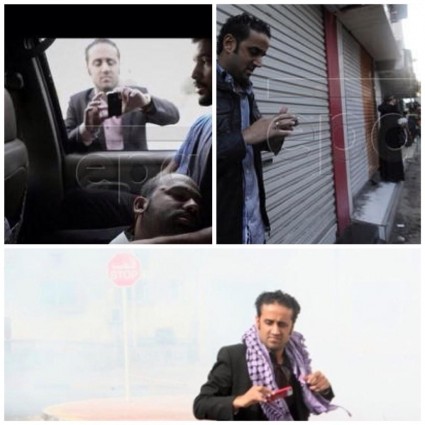 Sayed Yousif Al-Muhafdha tweets picture of wounded protester
Sayed Yousif Al-Muhafdha tweets picture of wounded protester
Bahrain: Arrest and detention of human rights defender Mr Sayed Yousif Al-Muhafdha
18 December, 2012 – Front Line Defenders
On 18 December 2012, the Public Prosecution Office ordered human rights defender Mr Sayed Yousif Al-Muhafdha to be detained for a period of seven days following his arrest the previous day after attendeding a protest in Manama.
Sayed Yousif Al-Muhafdha is the acting vice-president of the Bahrain Centre for Human Rights (BCHR), one of the three short-listed nominees for the 2012 Martin Ennals Award for Human Rights Defenders.
On 17 December 2012, Sayed Yousif Al-Muhafdha was arrested in Manama on charges of spreading false information over Twitter. Prior to the arrest he was monitoring and documenting a protest in Manama as it unfolded. The following day, the Public Prosecution Office ordered his detention for seven days pending an investigation. He is currently being held in Hooth Al-Jaff prison in the Governorate of Muharraq.
The arrest took place on the eve of a visit to Bahrain by a delegation of Members of the European Parliament (MEPs) with a focus on human rights issues. Sayed Yousif Al-Muhafdha previously attended a round table on the human rights situation in Bahrain at the European Parliament (EP) in Brussels on 4 December 2012. The MEP who hosted the round table was not granted a visa to be part of the EP delegation.
This is the second time the human rights defender has been arrested in the last two months. On 2 November 2012 in the village of Diraz, he was arrested on charges of rioting and participating in an illegal gathering. These charges related to a protest that took place in the village that day and which the human rights defender denied having participated in. He was released without charge on 14 November 2012.
Front Line Defenders is concerned by the arrest and detention of Sayed Yousif Al-Muhafdha and believes these measures are solely motivated by his peaceful advocacy in defence of human rights in Bahrain. Front Line Defenders has previously issued urgent appeals and updates on his situation on a number of occasions including on 5 November 2012 and 15 November 2012. …source
December 18, 2012 Add Comments
Russia takes position for Syria exodus
Russia sends warships to Syria for possible evacuation
18 December, – By Erika Solomon – Reuters – The Daily Star
BEIRUT: Russia sent warships to the Mediterranean to prepare a potential evacuation of its citizens from Syria, a Russian news agency said on Tuesday, a sign President Bashar al-Assad’s key ally is worried about rebel advances that now threaten even the capital.
Moscow acted a day after insurgents waging a 21-month-old uprising obtained a possible springboard for a thrust into Damascus by seizing the Yarmouk Palestinian camp just 2 miles from the heart of the city, activists said.
The anti-Assad opposition has posted significant military and diplomatic gains in recent weeks, capturing a series of army installations across Syria and securing formal recognition from Western and Arab states for its new coalition.
Assad’s pivotal allies have largely stood behind him. But Russia, his main arms supplier, appeared to waver this week with contradictory statements repeating opposition to Assad stepping down and airing concerns about a possible rebel victory.
Russia’s Interfax news agency quoted unnamed naval sources on Tuesday as saying that two assault ships, a tanker and an escort vessel had left a Baltic port for the Mediterranean Sea, where Russia has a port in Syria’s coastal city of Tartus.
“They are heading to the Syrian coast to assist in a possible evacuation of Russian citizens … Preparations for the deployment were carried out in a hurry and were heavily classified,” the Russian agency quoted the source as saying.
It was not possible to independently verify the report, which came a day after Russia confirmed that two citizens working in Syria were kidnapped along with an Italian citizen.
In Damascus, activists reported overnight explosions and early morning sniper fire around the Palestinian refugee camp of Yarmouk. The Yarmouk and Palestine refugee “camps” are actually densely populated urban districts home to thousands of impoverished Palestinian refugees and Syrians.
“The rebels control the camp but army forces are gathering in the Palestine camp and snipers can fire in on the southern parts of Yarmouk,” rebel spokesman Abu Nidal said by Skype.
“Strategically, this site is very important because it is one of the best doors into central Damascus. The regime normally does not fight to regain areas captured any more because its forces have been drained. But I think they could see Yarmouk as a red line and fight back fiercely.”
Syria hosts half a million Palestinian refugees, most living in Yarmouk, descendants of those admitted after the creation of Israel in 1948, and has always cast itself as a champion of the Palestinian struggle, sponsoring several guerrilla factions. …source
December 18, 2012 Add Comments
Hamad moves to set-up legal process to protect GCC Human Rights Abusers
HM the King’s Initiative to Set up an Arab Court for Human Rights Discussed
18 December, 2012 – Bahrain News Agency
Manama, Dec. 18. (BNA) – His Majesty King Hamad bin Isa Al Khalifa’s initiative to establish an Arab Court for Human Rights, in order to consolidate human rights protection and keep abreast of the latest international developments in this regard, will today top the agenda of the third meeting of senior Arab legal and human rights experts, held at the headquarters of the Arab League in Cairo under the chairmanship of its Secretary-General Dr. Nabil Al-Arabi.
On the occasion, the Foreign Ministry’s Undersecretary for Regional and GCC Affairs Ambassador Hamad Ahmed Abdulaziz Al Amer asserted that HM the King’s initiative stems from a desire to develop the institutional framework of human rights in the region and address the shortcomings that exist in the Arab Charter on Human Rights, adding the court will bring about a quantum leap in the field of human rights protection in the Arab world and prevent foreign sides from using the human rights issue to harm Arab countries.
It is to be noted that the meeting is in line with the resolution issued by Arab League on March 10th, 2012 to set up an Arab Court for Human Rights.
The panel has held a number of meetings and will convene in Bahrain next month to discuss and approve the resolution and then submit their report to the next Arab Summit, to be hosted by Doha by the end of March, 2013. …source
December 18, 2012 Add Comments
Bahrain Normal: Arbitrary hassassment and assualt by “police” on Business Patrons
December 18, 2012 Add Comments
USG tries to block legal actions aimed at stopping President from murdering Children and Citizens
U.S. Asks Court Not To Consider Targeted Killing Challenge
14 December, 2012 – American Civil Liberties Union
FOR IMMEDIATE RELEASE
NEW YORK – The U.S. government today filed its first response to a lawsuit challenging the targeted killing of the three U.S. citizens in Yemen last year, Anwar Al-Awlaki, his 16-year-old son Abdulrahman and Samir Khan. The American Civil Liberties Union and the Center for Constitutional Rights, which brought the case on behalf of the families of the Americans who died, issued the following statement about the government’s motion to dismiss:
“The essence of the government’s argument is that it has the authority to kill Americans not only in secret, but also without ever having to justify its actions under the Constitution in any courtroom. To claim, as the administration has today, that the courts have no role at all to play in assessing whether the government’s targeted killings of Americans are lawful – even after the fact – simply cannot be squared with the due process clause.
“The president himself has acknowledged that the targeted killing program must be subject to more meaningful checks, but there is little evidence of that recognition in the brief filed by the government today. If the court accepts the government’s position, it is not only the current president but every future president who will wield the power to kill any American he or she deems to present a threat to national security, without ever having to explain that action to a judge. The Constitution requires more.” …more
December 17, 2012 Add Comments
“My brother is dying”: Freedom or Death hunger striker Samer Issawi reaches 138 Days
“My brother is dying”: an urgent appeal from family of hunger striker Samer Issawi
by Malaka Mohammed – The Electronic Intifada – Gaza City – 17 December 2012
Samer Issawi has just turned 33. He spent his birthday on hunger strike.
On Sunday I phoned his sister Shireen. “Save Samer, he is dying,” was the first thing she said. Samer had gone without food for 138 days.
“The last news we got was on 14 December when the Israeli occupation court refused to release Samer on bail. I have received news from different sources indicating that my brother has recently started suffering from severe pain in all of his body especially in his muscles, abdomen and kidneys.
“He has an acute vitamin B-12 deficiency. His body has begun to eat his muscles and nerves. It seems he has lost the control of his limbs as a result of malfunction of the nerves. His vision is frail as a result of fainting four to five times a day and his body is covered with bruises. He is vomiting blood, his heart is weakening and he can barely breathe.”
I asked Shireen: “When have you seen your brother?”
“Like a skeleton”
“No one has met or spoken to him since his current arrest. I have seen him on Thursday [13 December] when he appeared in court. He looked like a skeleton sitting in a wheelchair, and he can’t move or walk. My brother was put in the slaughterhouse of Ramleh Prison Hospital during his first month of the strike. A month later he was put in a small cell as a punishment. He suffered the solitary confinement in a two-meter square room, meant to pressure him to end his strike.”
“Where is he now?” I asked.
“He is still in a small dark room in Assaf Harofeh hospital. He is kept in isolation; no one can see him, not even his loved ones. The only human contact he has is the guards, who misleadingly wear white uniforms. His legs are tied with shackles that look even bigger now against his tiny skeleton.”
Loss of consciousness
Shireen spoke of how her brother lost consciousness seconds after being given a medicine by the Israeli prison authorities on 9 December. It was two days before he regained consciousness. “There is no doubt that they want to kill him,” Shireen said.
Samer Issawi wrote a letter about the incident, which was translated and published by the Ahrar Center, a prisoner rights group, on 12 December. …more
December 17, 2012 Add Comments
Children Mass Murdered in the US is dwarfted by Foreign Children Mass Murdered by the US
Sandy Hook: America’s culture of violence
17 December,2012 – by Heidi Morrison – Le Monde Diplomatique
Seeking an explanation for tragic violence, we often turn to history and ask ourselves how we got to this point. Writing the historical narrative for the forces that led to the horrific elementary school massacre of 28 people, including 20 children, at Sandy Hook has already begun. Commentators correctly place Sandy Hook in a recent line of similar incidents (Aurora, Fort Hood, Virginia Tech…) — all testimony for America’s lack of dialogue on gun control and commitment to mental health services. The narrative holds that American culture is becoming increasingly violent.
In the last decade, children in places like Pakistan, Yemen, Iraq and Gaza have also died at the hands of America’s culture of violence. Yet, there is no national outpouring of grief and outrage in America for these children. There is a disconnect in the American psyche between what causes our own children to die and what causes other children abroad to die.
A recent study by Harvard’s School of Public Health revealed that where there are more guns, there are more incidents of homicide. Yet, there is little regulation of arms in America and token regulation of American arms in the world. Most people in America can purchase a gun without having to undergo training, meet health requirements, obtain liability insurance, or participate in a system of renewals and inspections. It is easier to own a gun license than a driver’s license. There are not adequate monitors to prevent weapons from flowing freely in American homes, cities, states, and regions. The weapons control us. We do not know when or where we will be gunned down; even our children learning their ABCs here in America are fair game.
On an international scale, America exports its culture of under-regulated violence. CIA drone attacks in Pakistan between 2004-2012 killed 176 children, just as innocent as those at Sandy Hook. The recent assault on Gaza killed 33 children with the full endorsement (and military aid) of President Obama. People around the world never know when they will be the next targets of American attacks. Children in Pakistan and Yemen hear American drones buzzing overhead on a regular basis, wondering when one will land on their school. …more
December 17, 2012 Add Comments
The Tunnels of Gaza
The tunnels of Gaza are a lifeline of the underground economy but also a death trap. For many Palestinians, they have come to symbolize ingenuity and the dream of mobility.
The Tunnels of Gaza
By James Verini – National Geographic – December, 2012
Editor’s note: As this issue went to press, the conflict in Gaza escalated. Hamas and other groups stepped up rocket fire on Israel, and the Israel Defense Forces launched an air and sea assault on Gaza, targeting the Hamas leadership and sites containing rockets and other weapons, along with civil government and media offices. Israel also extensively bombed the smuggling tunnels in Rafah.
For as long as they worked in the smuggling tunnels beneath the Gaza Strip, Samir and his brother Yussef suspected they might one day die in them. When Yussef did die, on a cold night in 2011, his end came much as they’d imagined it might, under a crushing hail of earth.
It was about 9 p.m., and the brothers were on a night shift doing maintenance on the tunnel, which, like many of its kind—and there are hundreds stretching between Gaza and Egypt’s Sinai Peninsula—was lethally shoddy in its construction. Nearly a hundred feet below Rafah, Gaza’s southernmost city, Samir was working close to the entrance, while Yussef and two co-workers, Kareem and Khamis, were near the middle of the tunnel. They were trying to wedge a piece of plywood into the wall to shore it up when it began collapsing. Kareem pulled Khamis out of the way, as Yussef leaped in the other direction. For a moment the surge of soil and rocks stopped, and seeing that his friends were safe, Yussef yelled out to them, “Alhamdulillah!—Thank Allah!”
Then the tunnel gave way again, and Yussef disappeared.
Samir heard the crashing sounds over the radio system. He took off into the tunnel, running at first and then, as the opening got narrower and lower, crawling. He had to fight not to faint as the air became clouded with dust. It was nearly pitch black when he finally found Kareem and Khamis digging furiously with their hands. So Samir started digging. The tunnel began collapsing again. A concrete-block pillar slashed Kareem’s arm. “We didn’t know what to do. We felt helpless,” Samir told me.
After three hours of digging, they uncovered a blue tracksuit pant leg. “We tried to keep Samir from seeing Yussef, but he refused to turn away,” Khamis told me. Screaming and crying, Samir frantically tore the rocks off his brother. “I was moving but unconscious,” he said. Yussef’s chest was swollen, his head fractured and bruised. Blood streamed from his nose and mouth. They dragged him to the entrance shaft on the Gazan side, strapped his limp body into a harness, and workers at the surface pulled him up. There wasn’t room for Samir in the car that sped his brother to Rafah’s only hospital, so he raced behind on a bicycle. “I knew my brother was dead,” he said.
I was sitting with Samir, 26, in what passed for Yussef’s funeral parlor, an unfinished-concrete room on the ground floor of the apartment block in the Jabalia refugee camp where the brothers grew up. Outside, in a trash-strewn alley, was a canvas tent that shaded the many mourners who had come to pay their respects over the previous three days. The setting was a typical Gazan tableau: concrete-block walls pocked by gunfire and shrapnel from Israeli incursions and the bloodletting of local factions, children digging in the dirt with kitchen spoons, hand-cranked generators thrumming—yet another Gaza power outage—their diesel exhaust filling the air.
“I was so scared,” Samir said, referring to the day in 2008 when he joined Yussef to work in the tunnels. “I didn’t want to, but I had no choice.” Thin, dressed in sweatpants, a brown sweater, dark socks, and open-toe sandals, Samir was nervous and fidgety. Like the others in the room, he was chain-smoking. “You can die at any moment,” he said. Some of the tunnels Yussef and Samir worked in were properly maintained— well built, ventilated—but many more were not. Tunnel collapses are frequent, as are explosions, air strikes, and fires. “We call it tariq al shahada ao tariq al mawt,” Samir said—“a way to paradise or a way to death.” …more
December 17, 2012 Add Comments
Thousands of Palestinians Celebrate Gaza Victory in Hamas Celebration: West Bank
Thousands of Palestinians Celebrate Gaza Victory in Hamas Celebration: West Bank
moqawama.com – 14 December, 2012
Thousands of Palestinians took part in a demonstration that was organized by the Palestinian Islamic Resistance Movement Hamas in the city of Nablus, northern of Occupied Palestine’s West Bank.
The event was held on Thursday to celebrate the recent victory over “Israel” during the eight-day bloody attack the Zionist entity launched against the Gaza Strip.
The demonstration, which coincided with the 25th anniversary of the establishment of Hamas, was the first of its kind authorized by the Palestinian Authority since 2007, according to AFP.
Some marchers carried wood models of the rockets fired at “Israel” during the war, which killed more than 150 Palestinians.
“Hamas – you are the guns; we are the bullets,” and, “Hamas, fire more rockets on Tel Aviv” chanted the demonstrators.
Addressing demonstrators, Secretary-General of Ramallah-based Palestinian faction, Fatah’s Revolutionary Council, Amin Maqbul stated, “Hamas has given thousands of martyrs, prisoners, and wounded for Palestine,” adding “Hamas steadfastness and victory in Gaza was a big victory for all Palestinian people.”
The popularity of Hamas has been on the rise despite “Israeli” and western attempts to undermine the group through Tel Aviv’s suffocating siege of Gaza and continued aggression against the Palestinian territory. …source
December 17, 2012 Add Comments
Manama-Gaza Solidarity
From Manama to Gaza: Solidarity Between Bahrain and Palestine
By: Yazan al-Saadi – 16 December, 2012 – Al Akhbar
As the Bahraini monarchy eagerly seeks to befriend Israel, the citizens of Bahrain have taken a different route, seeing parallels between theirs and Palestinians’ struggle against repression. A recent solidarity trip to Gaza by Bahraini medical officials is testament to the links that can’t be stymied by governments.
“Palestinians are in our heart since birth. It is in the heart of all Bahrainis. It is the central cause for all Arabs and Muslims – to the extent that [we are willing] to be a martyr for Palestine,” Dr. Nabeel Tammam tells Al-Akhbar.
It is the connection of these forces that clashes directly with the growing alliance between Israel and the Bahraini monarchy.
Tammam is one of Bahrain’s leading otolaryngologist, or ear, nose, and throat, consultants. Beyond his renowned medical expertise, he is also known for his political activism in opposition to the Bahraini monarchy, as a member of both the Bahrain Human Rights Society and the National Democratic Action Society (Wa’ad) – the largest leftist political party in the country.
His human rights and political work have come at great risk. Together with hundreds of other medical professionals in Bahrain, Tammam was detained, tortured, and convicted as part of an overall Bahraini government policy of retribution against those who dared to support the pro-democratic protests that erupted in February 2011.
Since receiving a three-month jail sentence, Tammam has spent most of his time between his medical practice and raising awareness of the repression faced by medics and Bahrainis in general. Despite pledges by authorities to implement recommendations for reform outlined by the Bahrain Independent Commission of Inquiry (BICI), this repression is ongoing.
Of late, Tammam and a group of Bahraini doctors organized and participated in a three-day medical visit to the besieged Gaza Strip in a show of solidarity and support with the Palestinian people.
This trip in late November represents but one example of the rich history of solidarity and cooperation between Bahraini and Palestinian civilians, who share an understanding of life under repression. It is the connection of these forces that clashes directly with the growing alliance between Israel and the Bahraini monarchy.
The 2012 Medical Trip
Tammam has a long history of supporting the Palestinian cause. He is a board member of the Bahrain Society Against Normalization with the Zionist Enemy and was one of the founders of the Bahraini medical trips to Gaza, initiated in 2009 after Israel’s brutal three-week assault on the densely-populated, encaged strip of land.
The 2009 trip concluded with the signing of a number of mutual cooperation agreements between the visiting Bahraini doctors and Palestinian medical organizations that included donations of equipment and medicine, as well as planning joint solidarity actions between the two parties.
This year, Tammam explained in an email correspondence with Al-Akhbar, the goal of the trip was to take “a humanitarian stand” in response to Israel’s latest massacre of Palestinians in Gaza.
“The whole trip was at our own expense (tickets, accommodation, and transport costs) and it was all a solidarity stand, as the day we reached Gaza started the declaration of ceasefire between the Palestinians and Israel,” he wrote.
The medical team spent three days in Gaza, during which they mainly visited medical buildings such as the Palestinian Red Crescent Society, Al-Shifa Hospital, the European Hospital in Khan Yunis, and the Ministry of Health, among other institutions.
“The destruction and the devastation caused to buildings, construction, and facilities were very clear as a result of the Israeli bombardment. All the serious [medical] cases were transferred to Egypt for intensive medical care. Only the mild and moderate ones remained in the local hospitals for follow-up treatments,” Tammam noted to Al-Akhbar. …source
December 17, 2012 Add Comments
Martyrs day faces tear gas as marches move into Manama
Martyrs day faces tear gas as marches move into Manama
17 Decemebr, 2012 – Shia Post
Bahraini security forces have fired tear gas and rubber bullets to disperse anti-regime protesters gathering to commemorate the Day of Martyrs in the capital city of Manama.
Hundreds of protesters once again took to the streets of the capital on Monday to mark the annual commemoration of two protesters martyred by the Al Khalifa regime forces in 1994.
Outraged demonstrators chanted anti-regime slogans in the streets, where Bahraini police tried to disperse them by stun grenades and tear gas.
According to reports, the Bahraini military had already set up checkpoints and extended patrols across the capital ahead of the Monday demonstration.
In a similar move on Sunday, the Saudi-backed Bahraini forces attacked hundreds of protesters who censured an annual speech by King Hamad bin Isa Al Khalifa, in which he praised security forces of the country.
The Bahraini uprising began in February 2011. The regime promptly launched a brutal crackdown on the protests and called in Saudi-led Arab forces from neighboring Persian Gulf states to help crush the demonstrations.
Bahraini protesters say they will continue holding demonstrations until their demands for the establishment of a democratically elected government and an end to rights violations are met. …source
December 17, 2012 Add Comments
Zayd al-Isa, Bahraini monarch has nothing but a license to kill
December 17, 2012 Add Comments

